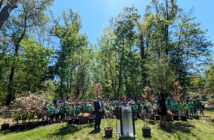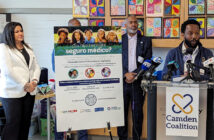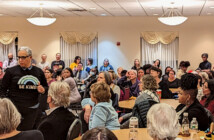Asked if the state will take more restrictive action amid an uptick in new cases, Governor Phil Murphy says, “I think you should assume we’re there.” Plus: $32M in CARES Act funds for county health depts.
By Matt Skoufalos | July 31, 2020
Another 699 New Jersey residents have tested positive for novel coronavirus (COVID-19), bringing the statewide total to 181,660 cases, Governor Phil Murphy reported Friday.
Sadly, 10 more residents have perished from complications related to the virus, bringing the statewide death toll to 13,944 lives lost during the pandemic.
In addition to those lab-confirmed fatalities, the state acknowledged another 1,875 probable COVID-19-related deaths.
Seven of those newly announced deaths have occurred within the past five days, Murphy said; three on July 27 alone.
However, for the first time in 142 days—almost five months—New Jersey went a full 24 hours without a COVID-19-related death in one of its hospitals, the governor said.
As deaths are a lagging indicator of the impact of the pandemic, that zero is attributable to lower reported numbers of new cases a month ago. However, Murphy suggested that it might be a fleeting victory, amid a month-over-month increase in new positive cases.
Careless individual behavior “is directly contributing to these increases, the governor said, calling out “everyone who walks around refusing to wear a mask, or who hosts an indoor house party, or who overstuffs a boat” as “directly contributing to these increases.
“This has to stop, and it has to stop now,” Murphy said.
“Consider this as being put on notice: we will not tolerate these devil-may-care, nonchalant attitudes any more.”
In about 30 days, the state has gone from managing a shrinking caseload to suppressing a rising one.
For a spot comparison: on June 30, New Jersey reported 461 new positive cases; it announced 699 Friday. A month ago, the average Rate of transmission (Rt) of new cases was 0.88; as of a sample taken Wednesday, the current number is 1.35.
Asked whether the trend in new cases could mean further restrictions, the governor responded, “I think you should assume we’re there.”
The governor added that no action has yet been taken, and urged residents to take immediate responsibility for reversing the trend.
“We’d better have a big weekend,” he said.
Hospitalization numbers are much improved month-over-month: on June 30, 992 people were hospitalized with a case of COVID-19, or while awaiting confirmation of their symptoms.
Among those patients, 211 were in intensive or critical care, and 174 of ICU and critical-care patients (82 percent) were on ventilators.
As of July 31, 695 people across New Jersey are hospitalized with a case of COVID-19: 352 have tested positive for COVID-19, and 343 are awaiting confirmation of their symptoms.
Among those hospitalized patients, 113 are in intensive or critical care, and 45 of ICU and critical-care patients (39 percent) are on ventilators.

Rt, the rate of transmission of new COVID-19 cases, hit 1.35 in New Jersey, a multi-week high. Credit: NJ Pen.
Rate of transmission (Rt) hits 1.35, spot positivity highest in South Jersey
The statewide average of COVID-19 spot positivity testing stood at 2.15 percent July 27; in South Jersey, it’s higher, at 3.01 percent.
Rt, the variable that describes the rate of transmission of new COVID-19 cases, hit 1.35 based on samples taken July 29—a new high overtaking the peak of 1.14 recorded Wednesday.
Any Rt figure of more than 1.0 means that each new COVID-19 patient is infecting more than one other person, on average, which means the virus is spreading.
“The alarms are going off,” Murphy said. “The only way to silence these alarms and get back to the process of moving forward is for everyone to take them seriously, not just most of you, but all of you; all of us.”
Since its mid-April COVID-19 spike, the lowest Rt recorded in New Jersey was 0.62, on June 9.
Long-term care accounts for half of all deaths, a fifth of those infected
Across the state, 608 long-term care (LTC) centers have reported at least one case of COVID-19, and account for 37,638 infected patients and staff, or 21 percent of total cases.
That includes 24,713 residents and 12,925 staffers sickened by the virus, as well as 6,916 lab-confirmed resident deaths (50 percent of the statewide total) and 120 facility-reported staff deaths.
Of 654 veterans residing in a state-run home, 388 residents have tested positive for COVID-19, and 146 have died from complications related to the virus. Ten veterans presently are hospitalized with COVID-19, and 240 have recovered from the virus.
At state-run psychiatric facilities, 213 of 1,227 patients and 509 staff members have tested positive for COVID-19. Thirteen patients and seven staffers have died from complications related to the virus.
To date, 54 New Jersey children aged 1 to 18 have been diagnosed with pediatric multisystem inflammatory syndrome, New Jersey Health Commissioner Judy Persichilli said. There are no new cases this week, and one previously suspected case was removed from the cumulative tally.
All have tested positive for an active COVID-19 infection or the presence of COVID-19 antibodies, indicating exposure to the virus. Two children are still currently hospitalized. No deaths have been associated with this syndrome in New Jersey.
NJDOH to distribute $32.3M federal funds to health depts.
The state health department will distribute $32.3 million in federal funds to county and local health departments to aid in their containment of the pandemic, Persichilli said.
Of that total, $13.7 million will be allocated to Local Information Network and Communication Systems (LINCS) agencies at 21 county health departments, plus that of the city of Newark.
The money will be used to hire staff to coordinate testing, contact tracing, quarantining, and social services within their jurisdictions, she said.
The remaining $18.6 million will be distributed to the 77 local health departments that don’t get LINCS funding. Those centers will use it to hire outreach coordinators to support testing, tracking, and caring for vulnerable populations within their communities, Persichilli said.
Previously, the state had allocated $5 million in federal funding for support of local contact tracing, testing, long-term care, and quarantining efforts, etc.
Read our ongoing round-up of COVID-19 coverage here.
Please support NJ Pen with a subscription. Get e-mails, follow us on Facebook, Twitter, and Instagram, or try our Direct Dispatch text alerts.







